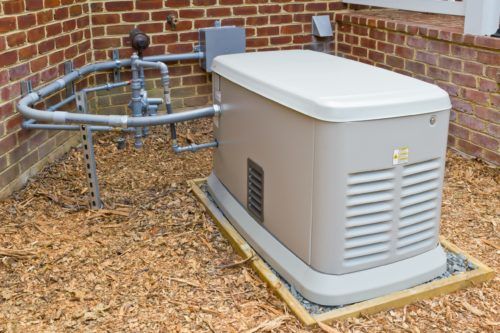
Power outages are becoming an increasingly common occurrence in many parts of the country. When an outage happens, you could be left with no way to heat or cool your home or even to light your house. Any food in your refrigerator or freezer is also at risk of spoiling. The easiest way to overcome these potential issues is to install a generator so that you’ll have a backup source of electricity available any time the power grid goes down. With this in mind, here is everything you need to know about whole-home generators, including how they work and how much they usually cost.
Whole-Home Generators vs. Portable Generators
When most people hear the word generator, they tend to think of the small portable units that are used for camping and other outdoor activities. These units typically have a capacity of somewhere between 2,000 and 8,000 watts. While these portable generators can still come in handy in case of a power outage, they typically don’t produce enough energy to do much more than power some lights and charge your phones or other smaller devices and appliances. In addition, they cannot actually be connected to your home’s electrical grid. Instead, you’ll have to either connect your devices directly to the generator or run an extension cord inside the house.
A whole-home generator is a much larger unit that is meant to provide enough electricity to meet some or all of your home’s energy needs in the event of a blackout. These units can range in size from as small as 7,000 watts up to 40,000 watts or more. The generator is wired directly into your home’s electrical system to ensure you’ll always have a backup source of power in the event of a blackout. Most whole-home generators can instantly detect when the power goes out and will automatically kick on as soon as an outage is detected.
Average Cost of a Whole-Home Generator
The nationwide average for a whole-home generator capable of powering a medium-sized home is around $15,000. However, the cost could be as low as $10,000 or as high as $30,000 or more. This is because a variety of factors can influence the total price, including the size, make, model, and type of generator. You will also need to take into account how much the generator will cost to install. Still, the size of the generator is generally the biggest determining factor as larger, more powerful units will obviously come with a higher price tag.
Determining What Size of Generator You Need
For a medium-sized home, you should expect to pay somewhere between $7,000 and $15,000 for the generator itself, plus additional costs for installation. However, this number is wholly dependent on what size of generator you need. Determining how much power you need isn’t an exact science as it depends on the size of your home, your local climate, and various other factors.
Larger homes will typically require more power than smaller homes, but this isn’t necessarily always the case. For instance, a smaller home in a cold climate will require more energy to run its heating system. The same is also true for hotter climates, where you’ll need to make sure you have enough power to run your air conditioner. In either case, your home may need a more powerful generator than a larger home in a milder climate may need.
A good rule of thumb is to choose a generator that provides a minimum of 10 watts of electricity per square foot of the home. Based on this, a 3,000-square-foot home would typically require a 30,000-watt generator to stay fully powered. Still, this depends on your actual electricity needs and how many appliances you plan on running at one time. You can easily reduce the overall cost by choosing a smaller generator, but this will mean you’ll be more limited in terms of electricity usage.
The easiest way to determine how large of a generator you need is to make a list of all the electrical items you will want or need to use during a power outage and how many watts each item uses. Typically, the biggest electrical requirements will be lighting, refrigerators and freezers, water heaters, and chargers for your phone and other electronic devices. When calculating your needs, it is important to consider how many of these items you may need to use at once.
You’ll also need to consider both starting wattage and running wattage for your larger appliances. For instance, your refrigerator may only use around 500 watts to run, but it could take as much as 1,500 watts to start. Furnaces, water heaters, and air conditioners typically have an even greater difference between starting and running watts. A 3.5-ton AC unit will typically use around 3,500 watts per hour in cooling mode and around 750 watts when only the fan is running, but it will likely require more than 11,000 watts to start up. Therefore, it is vital that you ensure your generator has adequate power to cover the starting wattage of any devices you may need to run during an outage.
Installation and Other Factors That Can Affect the Cost
The price of the generator itself isn’t the only thing that will affect the total cost as you’ll also need to take installation into account. To work properly, a standby generator will need to be installed and wired by a professional electrician. Site preparation, labor, and materials are all factors that will affect the installation cost. Typically, the installation cost will be anywhere from $500 to $5,000, depending on the size of the generator, your electrician’s hourly rates, and the amount of work required. Once the generator is installed, you should also expect to pay up to several hundred dollars a year for maintenance plus additional costs for fuel to run the generator.
In most cases, it will be necessary to upgrade your electrical panel in addition to wiring the generator into your electrical system. If you choose a propane generator, you’ll also need to pay to have a propane storage tank installed. Alternately, a natural gas generator will require having a gas line run from the home to the generator.
The generator will also need to be installed onto a concrete pad. If you don’t have a suitable concrete pad next to your home, you’ll also need to pay to have the site prepped, and concrete poured. Whole-home generators also require an overhead canopy to protect them from weather and the elements, which is yet another additional cost.
If you’re considering upgrading your house with a whole-home generator, Black-Haak has got you covered. As a full-service electrical company in Fox Valley, we can handle any of your home generator needs. We specialize in whole-home generator installation, maintenance, and repairs, and our expert electricians can also assist you in determining how large of a generator you need to meet your home’s energy requirements. Our team can also handle any of your other electrical maintenance and wiring needs, as well as heating and cooling installation, maintenance, and repair. To learn more about the benefits a whole-home generator can provide for you and your family, contact Black-Haak today.

